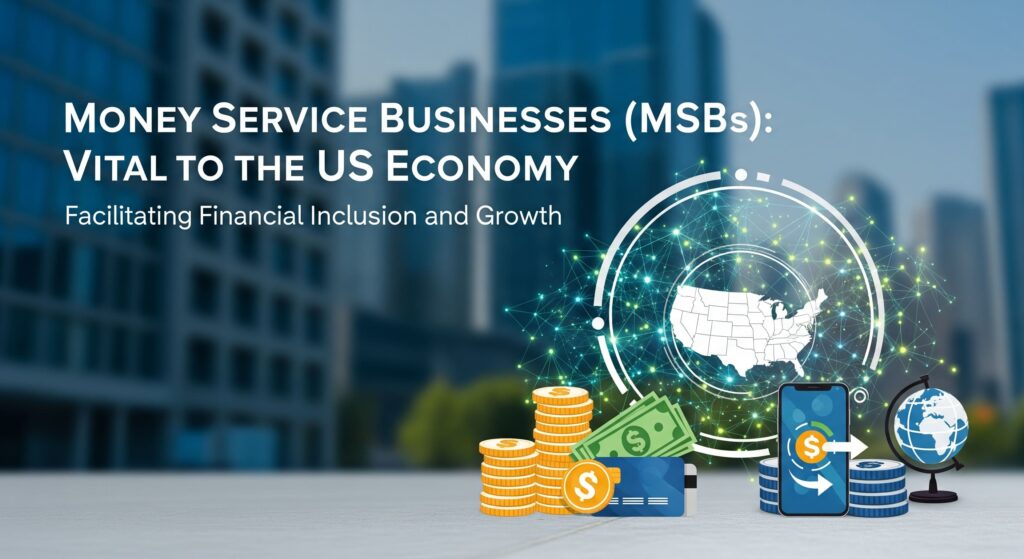Money Services Businesses (MSBs) play a crucial and often underappreciated role in the U.S. financial system. From the early days of check cashers and currency exchanges to today’s sophisticated digital wallets and cross-border payment platforms, MSBs have consistently bridged gaps in financial access. In 2025, their role is more vital than ever—both for economic growth in the United States and as a launchpad for international banks seeking access to U.S. markets.
Why MSBs Matter to the U.S. Economy
MSBs are the backbone of financial inclusion and innovation. Millions of Americans rely on MSBs to transfer money, exchange currencies, and manage everyday financial needs outside of traditional banks. By enabling remittances, prepaid cards, mobile wallets, and crypto services, MSBs:
- Support Small Businesses and Consumers: MSBs give entrepreneurs and underserved communities affordable access to payment and remittance channels, empowering them to transact globally.
- Enhance Competition in Finance: By lowering barriers to entry, MSBs challenge traditional banks and foster innovation in payments, lending, and embedded finance.
- Fuel Cross-Border Trade: MSBs enable international money transfers, supporting immigrant communities and driving billions of dollars into local economies.
- Expand Digital Finance: As consumer behavior shifts toward mobile and instant payments, MSBs provide the regulatory foundation for digital wallets, crypto custody, and neobank-style services.
The Modern MSB Advantage
Historically, MSBs faced fragmented regulation: each U.S. state had its own licensing requirements, forcing businesses to duplicate compliance efforts. This complexity limited expansion and added significant cost.
That has changed. By 2025, 31 states have adopted or partially adopted the Money Transmission Modernization Act (MTMA), creating harmonized standards for licensing, bonding, and supervision. This transformation means:
- Uniform capital requirements (≥ $100k or 3% of obligations) make financial planning more predictable.
- Shared examinations reduce redundant audits and regulatory friction.
- Standardized applications and compliance rules streamline multi-state licensing.
In practice, this means companies can launch multistate MSBs more efficiently than ever before, achieving economies of scale and faster access to national markets.
Why MSBs Are a Solid Option for Building a Financial Services Business
For fintechs, card issuers, and payment innovators, an MSB license isn’t just a legal necessity—it is a growth enabler. A properly structured MSB allows a company to:
- Issue prepaid and credit cards through BIN sponsorships.
- Connect directly to U.S. payment rails like ACH, Fedwire, and SWIFT.
- Manage balances, process payments, and facilitate digital wallets.
- Launch credit products, merchant cash advances, or receivables financing.
These capabilities make MSBs a foundation for scalable financial services businesses. Unlike stand-alone state licenses, which may restrict operations, a multistate MSB strategy creates a unified compliance program that can power a nationwide footprint.
Adding MSBs to International Banking Structures
One of the most compelling strategies today is combining a U.S. MSB with an international bank licensed in Puerto Rico (or another U.S. jurisdiction).
Puerto Rico offers a flexible International Financial Entity (IFE) license, allowing banks to operate globally while remaining under U.S. federal standards. However, IFEs cannot independently access domestic U.S. payment rails. By layering in a U.S. MSB, international banks can:
- Directly access U.S. ACH, Fedwire, and SWIFT systems, enabling seamless dollar transactions.
- Offer U.S. credit card programs, powered by BIN sponsorship.
- Expand lending products into merchant finance, receivables, and digital credit lines.
- Establish correspondent accounts with U.S. banks, improving credibility and operational reach.
This MSB–IFE dual structure bridges Puerto Rico’s international capabilities with mainland U.S. infrastructure, creating a powerful hybrid model for global banks, fintechs, and payment firms.
Conclusion
MSBs are no longer just check cashers or money transmitters; they are integral players in the modern financial ecosystem. In 2025, they are essential for scaling fintechs, expanding international banks into the U.S., and fueling innovation across payments, lending, and digital assets.
With the adoption of the MTMA making multistate licensing faster and more cost-effective, there has never been a better time to build a financial services business on the foundation of an MSB. And for international banks, pairing an MSB with a Puerto Rican IFE unlocks access to U.S. markets and payment networks—positioning these institutions to compete at the highest levels.
In short: MSBs are not just important to the U.S. economy—they are the gateway to its future.

